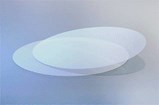Thinner Glass Wafer For MEMS Industry

- MEMpax brings major advantages.
- New borosilicate glass perfectly suited to meet growing demands of the MEMS industry for thinner glass wafers.
With MEMpax, SCHOTT North America, Inc. is now introducing a new, thinner, high quality borosilicate glass to the market for use in micro-electro mechanical systems (MEMS) technology. It will be available in thicknesses from 1.1 mm down to 0.1 mm.
MEMpax has physical, thermal and chemical properties similar to Borofloat 33. Due to a modified manufacturing process, MEMpax can be finished with a fire-polished surface, a new development which is very beneficial for MEMS and other ultra-thin borosilicate glass applications.
To attain a glass that is wafer-thin, SCHOTT incorporates the same production process used to create other ultra-thin sheet glass products like AF32 and D 263. The MEMpax produced in this manner then receives a fire-polishing which gives the glass an extremely high-quality and pristine surface and offers processing cost advantages.
"Our new MEMpax borosilicate glass provides a major advantage for the market," said Uwe Wilkens, Product Manager of Electronics & Biotech at SCHOTT Advanced Optics. "With its thickness range offered down to 0.1 mm and its superior surface quality, it is ideal for use in areas that require extremely thin borosilicate glasses.
The material properties of MEMpax allow anodic bonding with silicon wafers: Under the influence of temperature and pressure, ions diffuse between silicon and glass, which results in a hermetic bond. In addition, the coefficient of thermal expansion of MEMpax corresponds to that of silicon, which results in no bending due to the differences in expansion when the glass-silicon compounds are subjected to heat.
Thanks to its low alkali content, MEMpax acts as a highquality insulator. For this reason, the glass is also suited for applications requiring good dielectric properties at temperatures of up to 450 degrees Celsius.
Further applications for the new MEMpax include all areas in which glass-silicon compounds play a role. Here, glass takes on the function of protecting the silicon wafers inside the sensors or connecting various components. "The demand for MEMS components in the consumer electronics sector in particular, e.g. as movement sensors in mobile phones, or video game consoles, continues to grow. We consider this to be an important field of business growth for our thin special glasses which will enable many new applications in the future," Uwe Wilkens concludes.
About SCHOTT
SCHOTT is an international technology group with more than 125 years of experience in the areas of specialty glasses, materials and advanced technologies. SCHOTT ranks number one in the world with many of its products. Its core markets are the household appliance, solar power, pharmaceuticals, electronics, optics, transportation and architecture industries. The company is strongly committed to contributing to its customers' success and making SCHOTT an important part of people's lives with high-quality products and intelligent solutions. SCHOTT is committed to managing its business in a sustainable manner and supporting its employees, society and the environment. The SCHOTT Group maintains close proximity to its customers with manufacturing and sales units in all major markets. Its workforce of around 17,500 employees generated worldwide sales of $4B (approximately 2.9 billion euros) for the 2009/2010 fiscal year.
About SCHOTT Advanced Optics
SCHOTT Advanced Optics in Duryea, PA. offers optical materials, components and filters. With a product portfolio of over 100 optical glasses, special materials, such as active laser glass, IR materials, sapphire, synthetic fused silica, ultra-thin glass, high-precision optical components, wafers, optical glass filters, Advanced Optics develops customized solutions worldwide for applications in areas such as optics, lithography, astronomy, opto-electronics, life sciences, and research. Advanced Optics masters the entire value chain: from customer-specific glass development and its production all the way to high-precision optical product finishing, processing and measurement.
SOURCE: SCHOTT North America, Inc.
